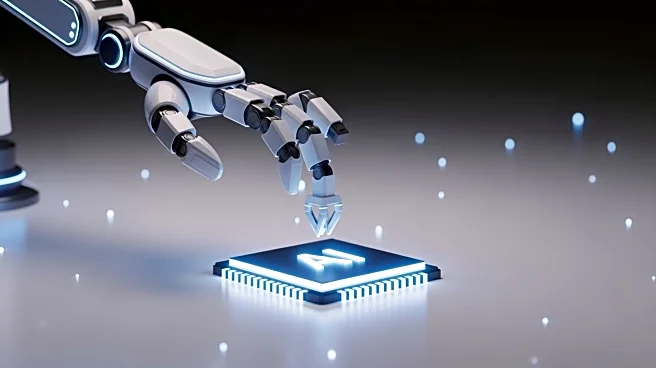What's Happening?
Tesla, led by CEO Elon Musk, is at a 'critical inflection point' as it transitions from focusing solely on electric vehicles to incorporating real-world artificial intelligence, autonomy, and robotics.
During the Q3 2025 earnings call, Musk emphasized Tesla's vision of transforming every car into a platform for self-driving and future robotaxi services. Despite record revenue of $28.1 billion, up 12% year-over-year, Tesla's profits fell sharply, with net income down 37% to $1.37 billion. The company delivered a record 497,099 vehicles in the quarter, but higher costs and one-time factors impacted margins. Tesla's automotive division remains its core growth engine, while energy storage deployments surged 81% year-over-year.
Why It's Important?
Tesla's shift towards AI and robotics represents a significant strategic pivot that could redefine the transportation industry. The company's focus on Full Self-Driving (FSD) and robotaxi platforms aims to change the nature of transport and reinforce its leadership in real-world AI. This transition could potentially increase Tesla's market share and influence in the AI sector, but it also poses risks due to the high costs and uncertain regulatory environment. Investors face the challenge of balancing faith in Musk's vision against the reality of rising costs and competitive pressures in the EV market.
What's Next?
Tesla plans to expand its autonomous pilot program in Austin and start paid robotaxi services in major U.S. metro areas. The company is also advancing its AI hardware roadmap, securing a $16.5 billion chip deal with Samsung and maintaining ties with TSMC for next-generation AI5 self-driving chips. Analysts are divided on Tesla's prospects, with some maintaining high price targets due to the company's growth potential in energy storage and deliveries, while others express caution due to safety concerns and market conditions.
Beyond the Headlines
Tesla's pivot to AI and robotics could have broader implications for the automotive industry, potentially accelerating the adoption of autonomous vehicles and reshaping urban transportation. The company's focus on AI-driven solutions may also influence regulatory policies and ethical considerations surrounding autonomous driving technology. Additionally, Tesla's advancements in AI hardware and humanoid robots could impact labor markets and societal norms related to automation.










